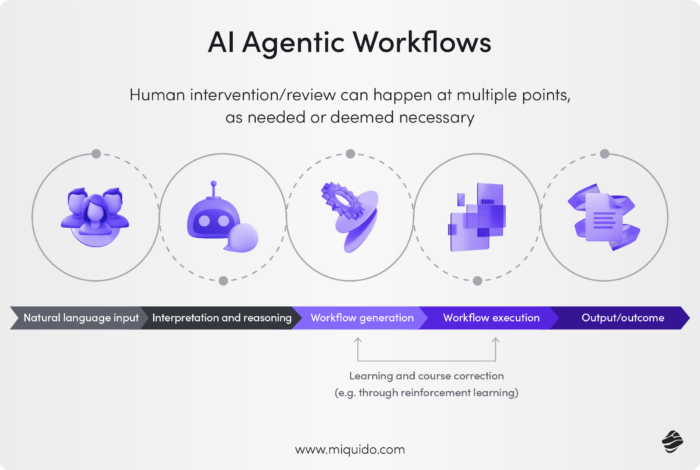Agentic AI Ushers in a New Era of Autonomous Digital Workers

AI’s Next Frontier: The Rise of Autonomous Agents
A groundbreaking shift is sweeping through the artificial intelligence sector in 2025: Agentic AI is rapidly evolving from research experiment to practical, powerful tool for business and consumers. Unlike traditional AI models, these new systems possess the ability to autonomously plan, execute, and adapt workflows—functioning as virtual coworkers and decision-makers. Their emergence promises to transform how organizations operate, spurring both enthusiasm and debate across the tech landscape[5][1].
What Is Agentic AI—and Why Now?
Agentic AI blends the deep reasoning and language skills of today’s most advanced foundation models with the autonomy to take meaningful action in the real world. Instead of generating a simple response to a prompt, these systems can break down goals, seek information, coordinate multi-step solutions, and iterate based on feedback—mirroring the workflow of a human colleague[5][1].
This capability is possible thanks to major advances in:
- Model reasoning and planning: New AI agents match or exceed human-like problem-solving for complex business, legal, and technical tasks[1][5].
- Data curation and synthetic training: Smarter data selection and generation are producing smaller, faster, and more capable AI systems, making agentic behaviors more accessible[1].
- Integration with business tools: Companies are embedding agents into office suites, cloud services, and workflow platforms, driving a reported 3x increase in enterprise AI pilot projects[5].
Business and Industry Impact
Agentic AI’s transformative power is already felt across multiple sectors:
- Corporate automation: Executives report up to 40% faster project completion when using agentic AI for routine tasks, scheduling, and data analysis.
- Science and medicine: Early applications include agents that autonomously design and run laboratory experiments, catalyzing biomedical research progress[2].
- Government services: Departments like Wisconsin’s DWD leverage AI agents for secure, 24/7 citizen services—reducing fraud and boosting satisfaction[4].
Challenges and Critical Questions
While agentic AI unlocks vast new capabilities, it raises fresh governance and security concerns:
- Trust and oversight: As systems make more independent decisions, organizations need robust records and auditing to ensure accountability[4][5].
- Security risks: More autonomy can mean greater exposure to cyber threats or misuse, as attacks on AI-powered workflows have been rising[4].
- Economic and workforce shifts: The pace of agentic AI adoption may fuel both efficiency gains and concerns about job automation, with industry observers urging policymakers to act with foresight[5].
What’s Next for Autonomous Digital Agents?
Experts predict the next 12 months will see:
- Broader rollout of agentic AI tools for team management, customer support, and operations[1][5].
- Development of standardized safety protocols as agents become integral to critical systems such as healthcare and finance[4].
- A new wave of investment in startups and infrastructure geared toward enabling and governing autonomous AI applications[5].
For business leaders, technologists, and the public, the arrival of agentic AI marks both a thrilling leap forward and a call for deliberate scrutiny. As virtual coworkers assume ever greater responsibility, the rules of work, trust, and innovation itself are being redefined—setting the stage for lasting impact in 2025 and beyond.
How Communities View Agentic AI
The debut of autonomous AI agents is sparking intense discourse across X/Twitter and Reddit’s tech communities. The central focus: Are digital coworkers the dawn of a new golden age—or the start of new risks?
-
1. Enthusiastic Embracers (≈40%)
Tech influencers like @pmarca and @sundarpichai call agentic AI “game-changing,” highlighting major productivity gains for knowledge workers. r/MachineLearning and r/ArtificialIntelligence feature posts detailing how agentic AI is automating routine coding and analysis, attracting thousands of upvotes. -
2. Cautious Optimists (≈25%)
Many users, including @katecrawford and r/Futurology posters, argue for careful rollout. They ask for stronger safety guardrails and pilot programs to ensure agents don’t fail unpredictably or introduce bias. -
3. Security Worriers (≈20%)
On r/netsec and among cybersecurity professionals like @alexstamos, a vocal segment warns about attack surface expansion. They share examples of agentic AI making risky decisions or being tricked by adversarial prompts, urging standards before widespread adoption. -
4. Labor & Ethics Advocates (≈15%)
Labor-focused voices point to the need for clear ethical guidelines and retraining initiatives. Hashtags like #AIFuture and comments from r/technology raise concerns about workforce disruption if digital agents take over more routine roles. -
Notable Industry Figures
Public contributions from @elonmusk, @drfeifei, and @demishassabis further shape the debate, with most experts urging balanced optimism and responsible governance.
Overall Sentiment: While the majority of engaged users signal excitement about agentic AI’s transformative potential, there is a strong undercurrent insisting on accountability, transparency, and security-first development.